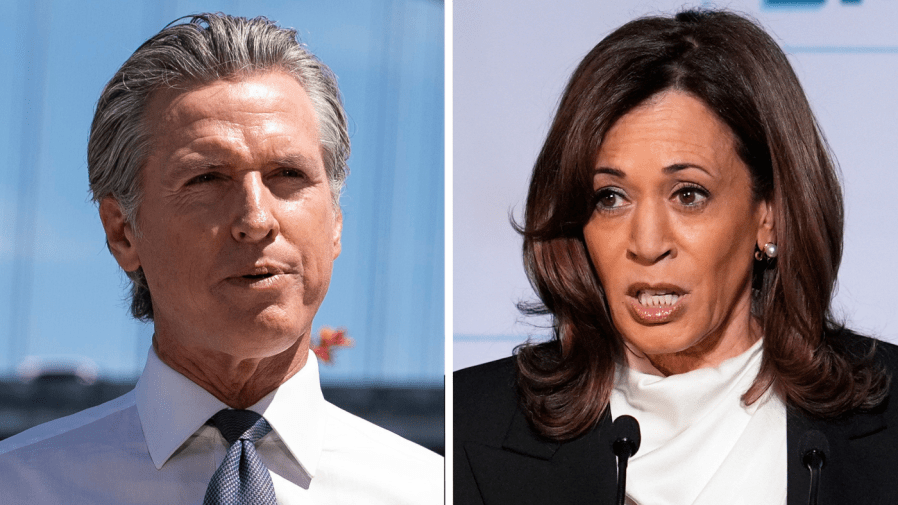Top Stories
Democrats Gear Up for 2028 Presidential Race: Key Contenders Emerge

As the Democratic Party begins to look ahead to the **2028 presidential election**, several prominent contenders are emerging, positioning themselves for a race that promises to be competitive. Following the party’s recent victories and the aftermath of **Kamala Harris’s** defeat in 2024, the landscape appears open for new leadership.
In a recent poll by Emerson College, **California Governor Gavin Newsom** has surged to the forefront, taking a more aggressive stance against former President **Donald Trump**. Newsom has used social media to challenge Trump directly, adopting his unique language in a series of posts, including merchandise that playfully mocks the former president. His strategy seems to resonate with Democratic voters, as he currently leads in the polls against **Harris** and former Transportation Secretary **Pete Buttigieg**. Despite concerns about his appeal in battleground states, Newsom’s provocative style has established him as a frontrunner.
Another key figure in the Democratic race is **Rep. Alexandria Ocasio-Cortez** from New York. Ocasio-Cortez is viewed as a potential champion for progressives seeking to reshape the party’s direction. At just 35 years old, she embodies a younger generation eager for change. Her platform, which includes proposals like **Medicare for All** and the **Green New Deal**, aligns with a significant faction of the Democratic base. However, her leftist agenda raises questions about its viability in swing states, where traditional Democratic policies have historically prevailed.
**Kamala Harris**, the former vice president, is also a significant contender. She is set to launch a book tour for her memoir titled **”107 Days,”** reflecting on her brief campaign after President **Joe Biden** withdrew from the race. Harris’s previous presidential bid was characterized by both successes and shortcomings, which will likely shape her prospects in 2028. The party may view her as a resilient candidate who could perform better in a second attempt or as someone who has not fulfilled expectations.
**Wes Moore**, the governor of Maryland, has gained attention for his recent social media exchanges with Trump. At 46, Moore offers a moderate approach compared to his more progressive counterparts. Yet, his national recognition remains limited, and he has yet to prove himself on a larger stage.
Meanwhile, **Illinois Governor JB Pritzker** has taken a combative stance against Trump, speaking out against the president’s comments regarding military deployment in Chicago. Pritzker’s wealth, estimated at **$3.9 billion**, positions him uniquely in the race, though it may complicate his connection with working-class voters.
**Gretchen Whitmer**, the governor of Michigan, is seen as a rising star. While she has adopted a more measured approach towards Trump, her ability to galvanize support in the Democratic base is notable. Her success in a key battleground state could enhance her candidacy, yet concerns linger about the party’s willingness to nominate a woman after two consecutive losses with female candidates.
**Pete Buttigieg**, a notable media presence and former mayor of South Bend, Indiana, has a strong following among educated voters. His previous primary performance was unexpectedly strong, though his ability to connect with Black voters remains a significant challenge.
**Josh Shapiro**, the governor of Pennsylvania, is another name to watch. His popularity in a crucial battleground state raises questions about his potential role as a vice presidential nominee in 2024. Shapiro’s pro-Israel stance may complicate his appeal among progressive voters, particularly in light of recent conflicts.
Finally, **Senator Chris Murphy** from Connecticut offers a conventional yet relatable option for voters. His vocal criticism of Trump positions him as a defender of democracy, but he faces the challenge of distinguishing himself amidst a roster of high-profile candidates.
**Kentucky Governor Andy Beshear** has managed to secure reelection in a traditionally Republican state, showcasing a blend of bipartisan appeal and progressive policies. His focus on infrastructure issues may resonate with voters, but he may be seen as too centrist by those seeking a more dynamic candidate.
As the Democratic Party prepares for the **2028 election**, these contenders are navigating a complex landscape shaped by past experiences and current political dynamics. The choices made in the coming months will significantly impact the party’s direction and its chances in the next presidential race.
-

 Lifestyle3 months ago
Lifestyle3 months agoLibraries Challenge Rising E-Book Costs Amid Growing Demand
-

 Sports3 months ago
Sports3 months agoTyreek Hill Responds to Tua Tagovailoa’s Comments on Team Dynamics
-

 Sports3 months ago
Sports3 months agoLiverpool Secures Agreement to Sign Young Striker Will Wright
-

 Lifestyle3 months ago
Lifestyle3 months agoSave Your Split Tomatoes: Expert Tips for Gardeners
-

 Lifestyle3 months ago
Lifestyle3 months agoPrincess Beatrice’s Daughter Athena Joins Siblings at London Parade
-

 World3 months ago
World3 months agoWinter Storms Lash New South Wales with Snow, Flood Risks
-

 Science3 months ago
Science3 months agoTrump Administration Moves to Repeal Key Climate Regulation
-

 Science2 months ago
Science2 months agoSan Francisco Hosts Unique Contest to Identify “Performative Males”
-

 Business3 months ago
Business3 months agoSoFi Technologies Shares Slip 2% Following Insider Stock Sale
-

 Science3 months ago
Science3 months agoNew Tool Reveals Link Between Horse Coat Condition and Parasites
-

 Sports3 months ago
Sports3 months agoElon Musk Sculpture Travels From Utah to Yosemite National Park
-

 Science3 months ago
Science3 months agoNew Study Confirms Humans Transported Stonehenge Bluestones









